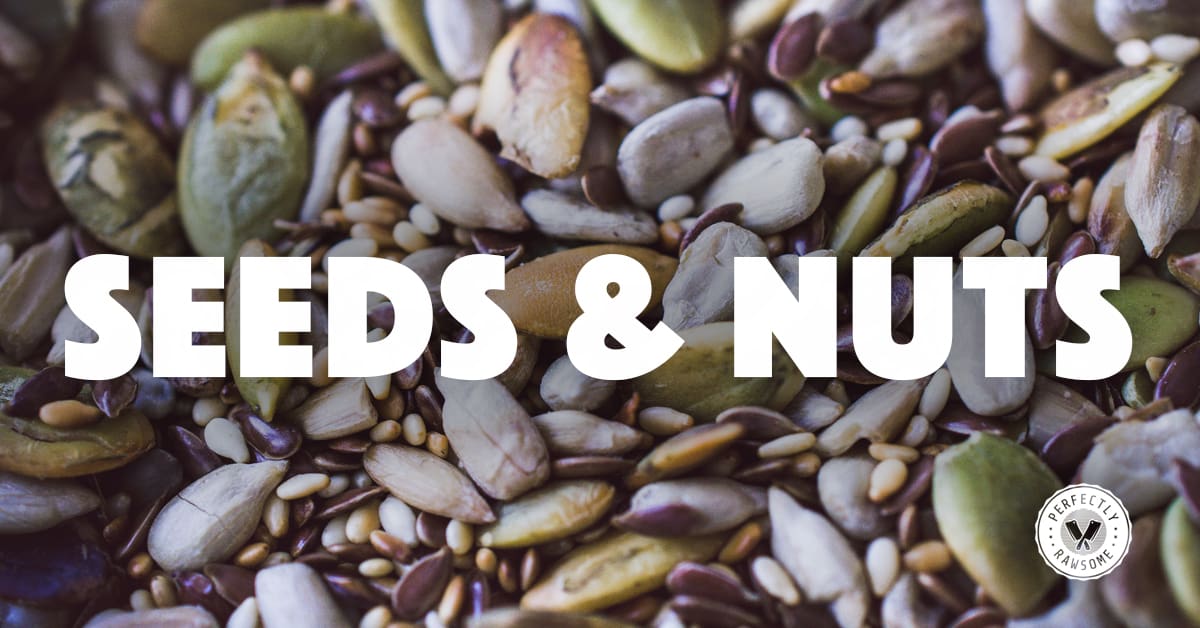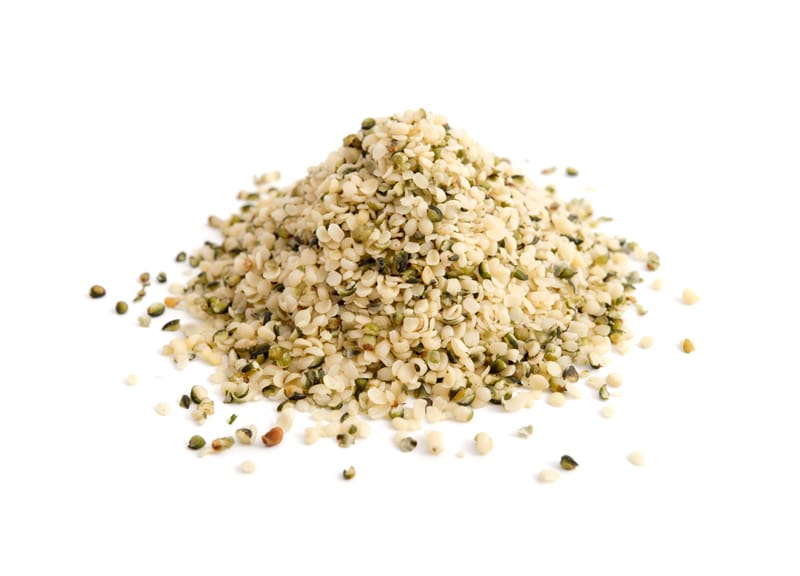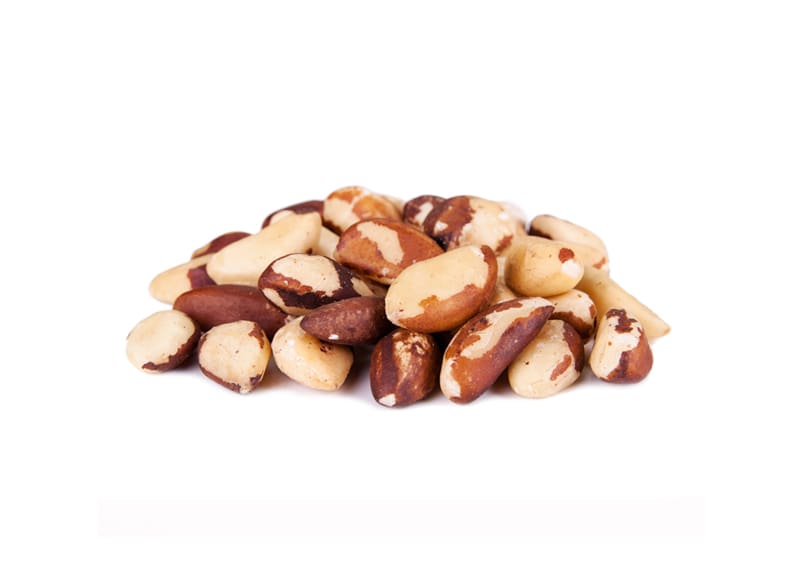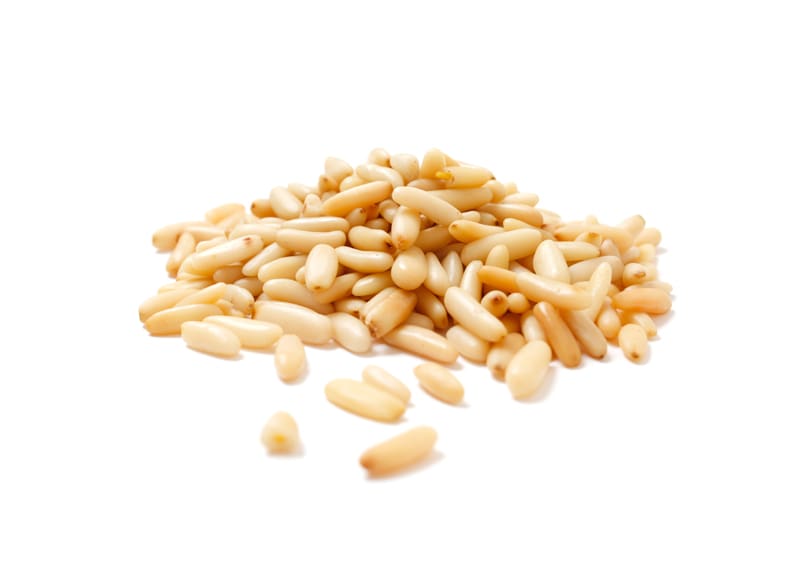The addition of seeds and nuts provides essential nutrients, beneficial phytonutrients, soluble and insoluble fiber to a raw diet for dogs. Seeds and nuts prove useful to complete nutritional holes in diets without the frequent use of whole prey.
Out of the plant ingredients ratio in BARF, it is recommended to feed seeds and/or nuts for their fatty acid, vitamin, and mineral benefits. Overall, 2% of the diet is a good starting ratio to include raw seeds and nuts.
Provides Essential Fatty Acids
Raw seeds and nuts provide essential fatty to raw diets.
Provides Essential Vitamins & Minerals
Raw seeds and nuts provide essential fat-soluble vitamins and minerals to raw diets.
Always Prepare for Optimal Digestion
All raw nuts and seeds must be prepared for optimal digestion and nutrient absorption.
Including raw seeds and nuts in a dog’s raw diet is not a component necessary to formulate a balanced diet. The nutrients can be provided through a few other ingredients or supplementation. However, seeds and nuts prove to be a beneficial whole food source of essential nutrients which is why they are recommended to include in raw diets.

Raw Seed Recommendations
Adding raw seeds to a dog’s diet provides many benefits and essential nutrients useful to complete a balanced diet. There are many seeds dogs can eat. However, it is important to feed them in moderation and prepare them for optimal digestion.

Hemp Seed Hearts
Hemp seed hearts are incredibly nutritious for dogs. These little seeds pack a nutritional punch and are jam-packed with essential nutrients. Hemp seed hearts provide essential fatty acids gamma linolenic acid (GLA) and alpha-linolenic acid (ALA) which is useful to balance the fatty acids within a raw diet.
In addition to providing fatty acids, hemp seed hearts provide a variety of other nutrients such as magnesium and manganese!
Nutritional Data
Macronutrients
The amount of calories, protein, fat, and carbs are based on 1oz (28g).
| Moisture | 4.9% |
| Protein | 31.6% |
| Fat | 48.7% |
| Carbohydrate | 8.67% |
Top Nutrients
The top nutrients are based on 1oz (28g) of shelled hemp seed hearts.
| ALA | 10 g |
| LA | 27.4 g |
| Manganese | 7.6 mg |
| Magnesium | 700 mg |

Sunflower Seeds
Another beneficial seed to feed to dogs is raw sunflower seeds. These seeds do provide essential fatty acids but provide linoleic acid (LA). The Vitamin E content within sunflower seeds is what makes them beneficial to a raw diet. Many raw diets are often lacking in fat-soluble Vitamin E, and sunflower seeds are a great whole food source of the essential nutrient.
In addition to the Vitamin E levels in sunflower seeds, they are also high in vitamin b6 and b9!
Nutritional Data
Macronutrients
The amount of calories, protein, fat, and carbs are based on 1oz (28g).
| Moisture | 4.7% |
| Protein | 20.8% |
| Fat | 51.5% |
| Carbohydrate | 20% |
Top Nutrients
The top four nutrients are based on 1oz (28g) of raw, shelled sunflower seeds.
| LA | 6.53 g |
| Vitamin E | 9.97 mg |
| Vitamin B6 | 0.38 mg |
| Folic Acid | 64 mcg |

Pumpkin Seeds
Pumpkin seeds are another seed option beneficial to add to a raw diet for dogs. These seeds are high in essential fatty acids but provide a different fatty acid profile in comparison to hemp seed hearts. Pumpkin seeds are high in linoleic fatty acid (LA) and lower in alpha-linoleic (ALA) fatty acids
In addition to pumpkin seed’s fatty acid content, they provide high levels of magnesium, manganese, and tryptophan!
Nutritional Data
Macronutrients
The amount of calories, protein, fat, and carbs are based on 1oz (28g).
| Moisture | 5.2% |
| Protein | 30.2% |
| Fat | 49% |
| Carbohydrate | 10.7% |
Top Nutrients
The top four nutrients are based on 1oz (28g) of raw, shelled pumpkin seeds.
| LA | 5.87 g |
| Magnesium | 168 mg |
| Manganese | 1.28 mg |
| Tryptophan | 0.16 g |
Toxic Seeds
Many seeds are safe to feed dogs but should be fed in moderation. However, do not feed the seeds and pits from fruits such as apples, cherries, avocados, peaches, plums, etc. These seeds and pits are known to cause toxicity in dogs and cause intestinal blockage.
Raw Nut Recommendations
Like raw seeds, adding raw nuts to a dog’s diet provides many benefits and essential nutrients useful to complete a balanced diet. There are many nuts dogs can eat. However, it is important to feed them in moderation and prepare them for optimal digestion.

Almonds
Raw almonds are beneficial to feed to dogs in a raw diet. Like seeds, nuts provide essential fatty acids but almonds are high in fat-soluble Vitamin E. Since many raw diets are lacking in Vitamin E, adding in raw almonds are a great whole food source of the essential nutrient.
In addition to the Vitamin E levels in almonds, they are also high in magnesium and manganese!
Nutritional Data
Macronutrients
The amount of calories, protein, fat, and carbs are based on 1oz (28g).
| Moisture | 4.4% |
| Protein | 21% |
| Fat | 49.9% |
| Carbohydrate | 21.5% |
Top Nutrients
The top four nutrients are based on 1oz (28g) of raw, shelled almonds.
| LA | 3.49 g |
| Vitamin E | 7.27 mg |
| Manganese | 0.61 mg |
| Magnesium | 77 mg |

Brazil Nuts
What makes Brazil nuts special is their concentrated amounts of selenium. One ounce (28.35 grams) of raw brazil nuts provides over 6% of an adult dog’s requirement for selenium. Therefore, a little goes a long way.
Nutritional Data
Macronutrients
The amount of calories, protein, fat, and carbs are based on 1oz (28g).
| Moisture | 3.4% |
| Protein | 14.3% |
| Fat | 67% |
| Carbohydrate | 11.7% |
Top Nutrients
The top four nutrients based on 1oz (28g) of raw, brazil nuts.
| Selenium | 543.5 mcg |
| LA | 6.90 g |
| Magnesium | 107 mg |
| Copper | 0.49 mg |

Pine Nuts
Pine nuts are another nut option that is beneficial to add to a raw diet for dogs. These nuts are another option to include essential manganese and zinc minerals. Additionally, they provide lutein carotenoid which is beneficial to eye health!
Nutritional Data
Macronutrients
The amount of calories, protein, fat, and carbs are based on 1oz (28g).
| Moisture | 2% |
| Protein | 13.7% |
| Fat | 68.4% |
| Carbohydrate | 13% |
Top Nutrients
The top four nutrients are based on 1oz (28g) of raw, shelled pine nuts.
| LA | 9.39 g |
| Manganese | 2.49 mg |
| Magnesium | 71 mg |
| Vitamin E | 2.65 mg |
Toxic Nuts
Many nuts are safe to feed dogs but should be fed in moderation. However, do not feed Macadamia nuts and Black Walnuts. These are known to be toxic to dogs and should be avoided.
Preparation Method
Carnivores do not have the essential tools to properly breakdown and digest plant matter in comparison to omnivores. Dogs do not have salivary enzymes for carbohydrate digestion and their jaw structure does not allow for grinding plant ingredients. However, dogs possess pancreatic enzymes for carbohydrate and starch digestion. It is recommended to process seeds and nuts to allow for enzymatic digestion.
Raw seeds and nuts do not digest well and they need to be processed for optimal digestion.
Soak
Raw seeds and nuts contain phytic acid which is a precursor nutrient to phosphorous. Phytic acid inhibits nutrient absorption when ingested. Soaking seeds and nuts reduces the phytic acid levels to allow for nutrient absorption. Add raw seeds or nuts in a container with lightly salted water (1/4tsp per 1/2 quart of filtered water). Add enough water to cover all seeds/nuts.
Strain & Wash
Strain the seeds/nuts after soaking in water for 12-24 hours. Lightly rinse the seeds after straining from the water they were soaking in. This step is to remove the water and phytic acid released in the soaking process. This water can be discarded; it will not be used in any further steps.
Chop/Grind
Place the soaked seeds/nuts in a food processor and grind until the seeds/nuts are completely and evenly ground. Chopping seeds and nuts promotes optimal digestion in dogs. Whole seeds and nuts often pass undigested in the stool.
Store
Place the ground, soaked seeds/nuts in a container and store them in the refrigerator. Only keep enough ground, soaked seeds/nuts for 7 days max and store any excess in the freezer. This is to prevent any unnecessary food spoilage.
Seed & Nut Mixtures
A combination of seeds and nuts can be used to provide multiple nutrients and benefits to a dog’s raw diet.
CLOSING COMMENTS
Adding seeds and nuts to a dog’s diet proves beneficial and useful when formulating a complete and balanced raw diet. Many seeds and nuts provide essential fatty acids such as ALA, GLA, and LA in addition to their fat-soluble vitamin and mineral content.
In order for dogs to get the most nutrition out of seeds and nuts, they must be soaked and ground prior to feeding. Lastly, always select raw seeds and nuts that are not toxic and have not been roasted, salted, or seasoned.
